In this edition of court judgements review, we look into the Supreme Court’s judgements on bribery in money laundering cases, issues pertaining to judicial independence, trademark infringement of ‘Rooh Afza’, Madras High Court’s decision on detention order, Delhi High Court’s judgement in deciding on minor status in POCSO cases, and Kerala High Court’s judgement regarding the online solemnization of marriage.
Supreme Court: Criminal activity, and generation of proceeds of crime are like Siamese twins in cases of corruption, registration of FIR is sufficient for ED to launch a probe.
In a significant development regarding the jurisdictional mandate of the Enforcement Directorate (ED), the Supreme Court in Y. Balaji vs. Karthik Desari & Anr.Etc, held that, unlike other cases, in corruption, criminal activity and generation of proceeds of crime are like ‘Siamese twins’, and receipt of bribe money itself is an act of money laundering.
A two-judge bench comprising Justice Krishna Murari and Justice V Ramasubramanian was hearing appeals against the Madras High Court’s judgement that put a hold on ED’s enquiry into a cash-for-jobs scam, where public servants were accused of collecting bribes in exchange for jobs in state transport corporation. The counsels for the accused argued about the locus to challenge the proceedings, while the respondent’s counsel responded to the contentions on the jurisdictional mandate of the ED. The court summed up the arguments from both sides and formulated two fundamental questions that need to be addressed.
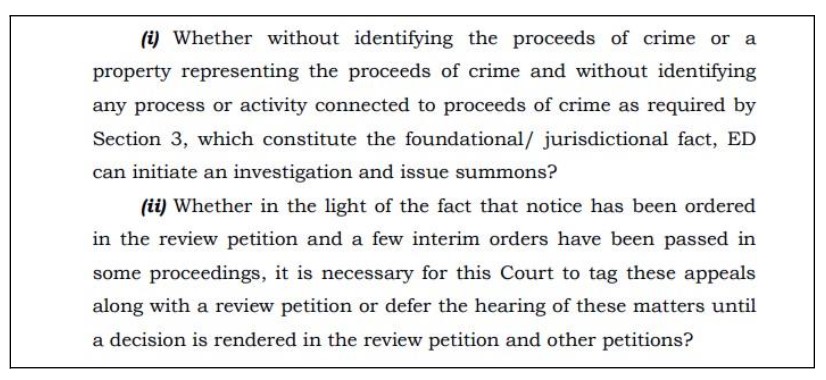
To the first question, the court referred to the Prevention of Money Laundering Act, 2002. On joint reading of Sections 2 and 3 of the act, it can be held, unlike other cases, in corruption cases, bribe money constitutes the ‘proceeds of crime’ within the meaning of Section 2(1)(u). Hence, the argument raised by the counsel for the accused that the mere generation of proceeds of crime is not sufficient to constitute the offence of money laundering is preposterous.
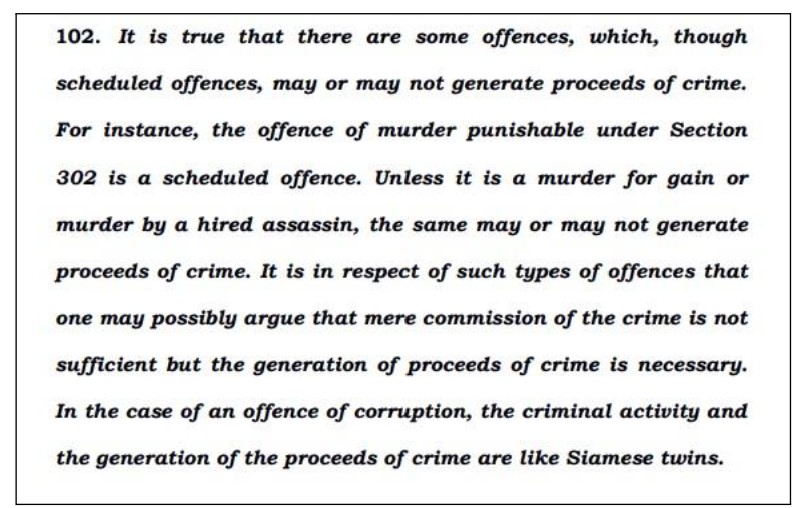
The second question deals with some portions of the judgment in Vijay Madanlal Choudhary & Ors. vs. Union of India & Ors. One of the points raised by the counsel for the accused is that in view of inherent contradictions contained in the decision in Vijay Madanlal Choudhary and in view of this Court having ordered notice in the review petition, the appeals on hand should also be referred to a larger Bench. However, the court held that the current petitions have nothing to do with those issues raised. The court held that the accused cannot have a piggyback ride on the review petition.

Supreme Court: Independence of the judiciary requires that pay of judicial officers must be stand-alone and not comparable, and Judiciary must have a say in matters of their finances.
The apex court in All India Judges Association vs. Union of India, held that judicial independence is part of the Basic Structure of the Constitution, and it requires that judiciary must have a say in matters of their finances.
The Supreme Court bench, comprising the Chief Justice of India DY Chandrachud, Justice PS Narsimha, and Justice V. Ramasubramanian, pronounced its judgement regarding the matters of judicial pay, pensions, and other similar issues of judicial officers. To ensure the financial independence and economic security of judicial officers, the apex court in 1993 called for an independent Judicial Pay Commission. Accordingly, the First National Judicial Pay Commission (“FNJPC”) was constituted by the Government of India by Resolution dated 21 March 1996, whose recommendations on matters pertaining to pay revisions, pensions were accepted. In 2010, these were extended to the district judiciary.
Pursuant to the report of the 7th Pay Commission, the apex court ordered the setting up of the Second National Judicial Pay Commission (SNJPC) in 2017. The SNJPC submitted its final report in 2020, and the court asked the states to file objections to the report. Before going through the report, the court looked at the evolution of judicial principles surrounding pay commissions.
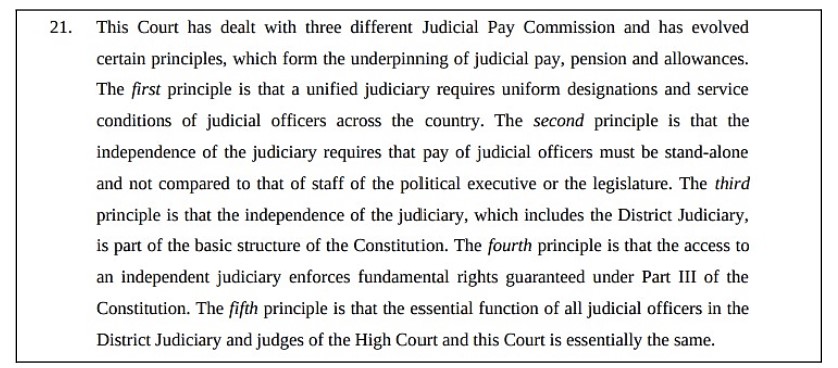
The court delved into each of these five principles in detail. The apex court also refrained from the usage of the term ‘subordinate judiciary’ when referring to district judiciary. It further held that respect must be accorded to the institution for its contribution to the country.
The court looked at the recommendations by the SNJPC and accepted a large portion of the recommendations. Some of the important recommendations accepted by the court pertained to the retirement age, financial assistance in cases of death, and gratuity among others. The list of accepted recommendations is explained in detail in the judgement.
Further, on the aspect of the implementation of the orders, the court asked the states to file compliance affidavits within four months.

Supreme Court: Not inclined to allow appeal against Delhi High Court’s order restraining use of ‘Dil Afza’ name for sharbat.
The Supreme Court, in Sadar Laboratories Pvt. Ltd vs. Hamdard National Foundation (India) & Anr. refused to entertain a petition challenging the Delhi High Court’s division bench order restraining Sadar Laboratories Pvt. Ltd to use the ‘Dil Afza’ trademark in its products.
The three-judge bench comprising of the Chief Justice of India DY Chandrachud, Justice PS Narasimha, and Justice JB Pardiwala was hearing an appeal petition filed by Sadar Laboratories private limited against the Delhi High Court’s order.
The word trademark “SHARBAT DIL AFZA” (also known as “the impugned trademark”), which is registered in favour of the Hamdard National Foundation in Classes 5 and 32, is at the centre of the current legal dispute. They assert that they have been producing and selling a sweet beverage concentrate under the name “SHARBAT ROOH AFZA” constantly since 1907. Under the brand name “SHARBAT DIL AFZA,” Sadar Laboratories private limited recently started a similar product (sweet beverage concentrate).
Earlier, a single judge bench of Delhi High Court refused to grant an interim injunction against Sadar Laboratories Pvt. Ltd. for their product ‘Dil Afza’. In the appeal against this application, the appellants had argued that using marks like “SHARBAT DIL AFZA” or “DIL AFZA” would certainly lead to confusion and would violate their registered trademark “SHARBAT ROOH AFZA” or “ROOH AFZA.”
The claim that the two competing marks were similar was denied by the single judge. According to the court, purchasing a bottle of sharbat would not elicit strong feelings, and consumers could tell “ROOH” from “DIL” in any case. The single judge had ordered the respondent to provide a quarterly report regarding its accounts until the suit was resolved, although declining to issue an interim injunction.
Upon hearing both parties, the division bench of Delhi High Court held that the ‘Rooh Afza’ Trademark required higher degrees of protection as it acquired immense goodwill. On the similarity of the signs and language, the court held that,
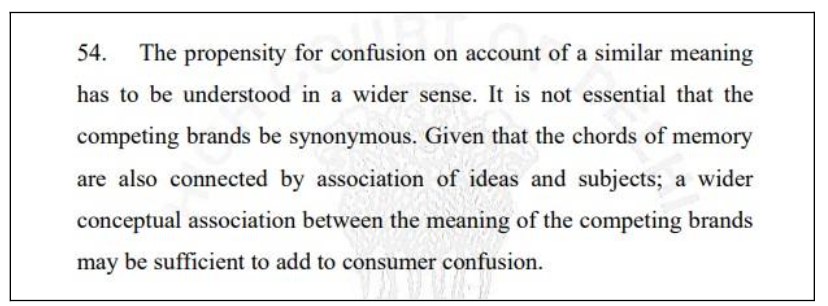
Further, the value of the product and the strength of the mark are to be considered when deciding on trademark infringement cases. Here the product is low-priced and hence the attention of customers would be cursory. Further, the strength of the mark is inversely proportional to the requirement of protection- the stronger the mark, the greater the required protection.
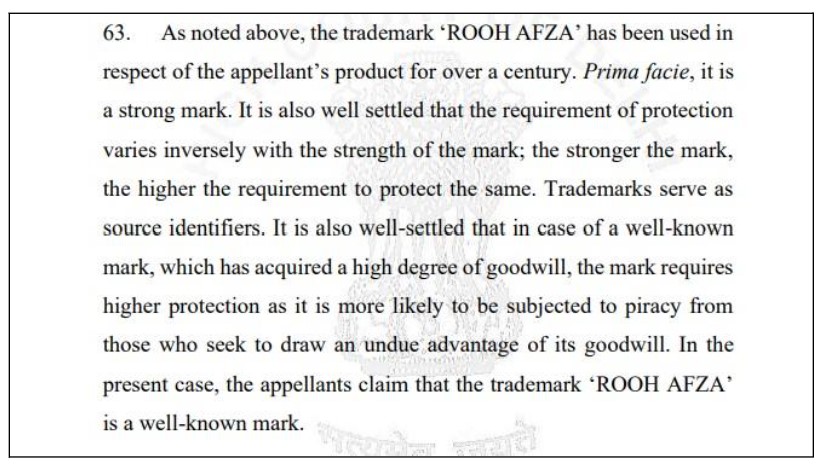
Accordingly, the Delhi High Court’s single judge order is set aside by the Division Bench of Delhi High Court. In an appeal against this order in the present case, the Supreme Court refused to entertain the petition.
Madras HC: Improper intimation of arrest hampers the Constitutional safeguard of right of the detenu to make effective representation.
The Madras High Court, in Harini vs. State of Tamil Nadu, quashed a detention order on the grounds that the intimation of arrest was not made properly, thereby hampering the constitutional rights of the detenu.
The division bench of Justice M Sundar and Justice Nirmal Kumar was hearing a petition praying for the issuance of a writ of habeas corpus to call for the records relating to the detention order dated 30 November 2022, passed against the detenu. The impugned detention order was issued in accordance with the Tamil Nadu Prevention of Dangerous Activities of Bootleggers, Cyberlaw Offenders, Drug Offenders, Forest Offenders, Goondas, Immoral Traffic Offenders, Sand Offenders, Sexual Offenders, Slum-Grabbers, and Video Pirates Act, 1982 (Tamil Nadu Act No. 14 of 1982).
The main issue brought up by the petitioner’s Counsel is that even though it has been claimed that the detainee’s wife received an SMS alerting her of her husband’s arrest on her mobile device, neither a signature nor any evidence supporting the claim that the arrest notification was transmitted through SMS to the petitioner’s mobile number. Thus, the detainee’s right to due representation was impeded.
The court, upon looking at the material evidence, agreed with the petitioner. It relied on the judgement of the same court in Akilandeswari vs. State, rep. by Secretary to Government, Home, Prohibition and Excise Department, Chennai, wherein it was held that,
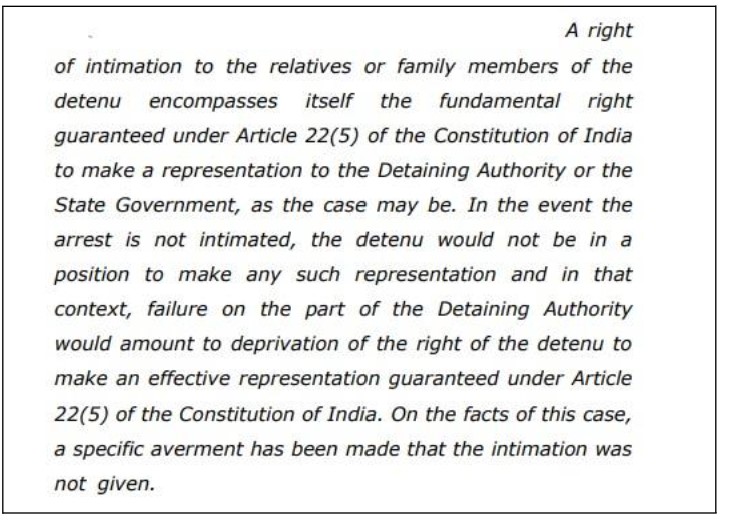
Further, the court held that curtailment of personal freedom in pursuance of a preventive detention law though has the constitutional sanction, is conditioned by many constraints, one of which is a chance for him to make representation against his detention. If his arrest is not informed to his dear and near ones, who could make representation against the detention order on his behalf, he cannot exercise the right given to him under Article 22(5) of the Constitution of India.
Accordingly, the court found the detention order infringing on the constitutional safeguard of effective representation, and hence, it is quashed. The Habeas Corpus petition is allowed.
Delhi HC: The inclination of the Court should be towards considering the lower side on the margin of error, when deciding on the age of child victim under the POCSO Act.
The Delhi High Court, in Raju Yadav vs. State of NCT of Delhi, held that when a child victim’s age is determined by the bone ossification test under the POCSO Act to be between 15 and 17 years old, the court shall lean toward taking the lower end of the margin of error into consideration.
The Single judge bench of Delhi High Court headed by Justice Jasmeet Singh was hearing an appeal against the order of the Special judge sentencing to undergo rigorous imprisonment for 10 years along with a fine of Rs.10,000/-. The counsel for the accused argued that the provisions of the POSCO act cannot be attracted as the age of the prosecutrix was not conclusive, since medical reports ascertained the age to be between 15-17 years, whereas various judgements of the courts point out the prevalence of plus/minus difference of 2 years in any bone ossification test, thus making the age of prosecutrix above the age of majority.
Upon hearing the arguments from both parties, the court held that undergoing another bone ossification test amounts to re-victimization, and hence cannot be allowed. On the confusion around the age range, the court looked at the objectives of the Protection of Children from Sexual Offences (POCSO) Act, 2012.
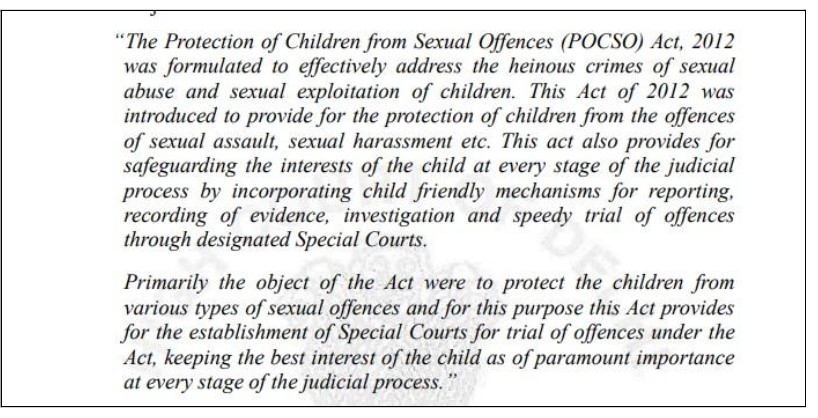
In Jarnail Singh vs. State of Haryana, the apex court has leaned towards the benefit of the lower age side to both the child in conflict with the law and the minor victim under the POCSO Act. The court further held that it cannot be the intention of the POCSO Act to treat a victim who is a borderline minor, as a major in case the victim does not have a birth certificate/school certificate and has undergone a bone ossification test. Such an interpretation would not be in furtherance of the POCSO Act but rather in contradiction and derogation to the objective and purpose of the POCSO Act.
Further, in Section 29 of the POCSO Act, there is a presumption of guilt against the accused. The prosecution is only required to lay the foundational facts which disclose the commission of an offence by the accused persons. Once the same has been done, it is the accused who has to rebut the presumption of guilt. In this case, the appellant was unable to rebut the presumption of guilt.
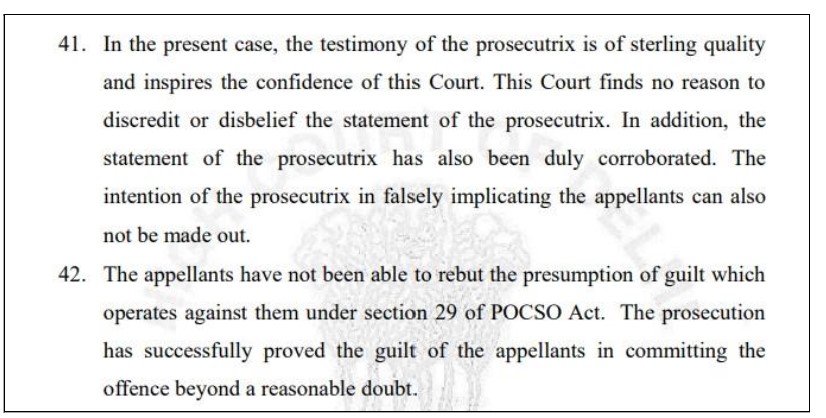
Accordingly, the appeals are set aside.
Kerala HC: Registering authority under the Special Marriage Act, 1954 cannot refuse solemnization of marriage online.
In Dhanya Martin vs. State of Kerala & Anr. and other connected cases, the Kerala High Court held that the registering authority under the Special Marriage Act, 1954 cannot refuse solemnisation of marriage online and directed the State Government to follow the directions in the interim order for solemnisation of marriage under the Special Marriage Act in all other matters until the Government prescribes any other mode for compliance.
The division bench of the High Court comprising Justice A. Muhamed Mustaque and Justice Sophy Thomas was hearing a batch of writ petitions regarding an authoritative pronouncement on a question related to the solemnisation of marriage under the Special Marriage Act, 1954, through Video Conferencing. The court in earlier judgements in Dioncey Augustine vs. State of Kerala, and Shitha V.K. vs. The District Registrar (General) answered the above question negatively, stating that sections 11 and 12 of the Special Marriage Act, 1954 require the physical presence of the parties, in the absence of which Section 13 that provides for the certificate of marriage, is invalid. This has been the stance of the Government also.
However, the single-judge bench of this court relied upon the doctrine of ‘updating construction’ that allows for the interpretation of the statute with reference to the changing societal conditions. The single-judge bench further held that,
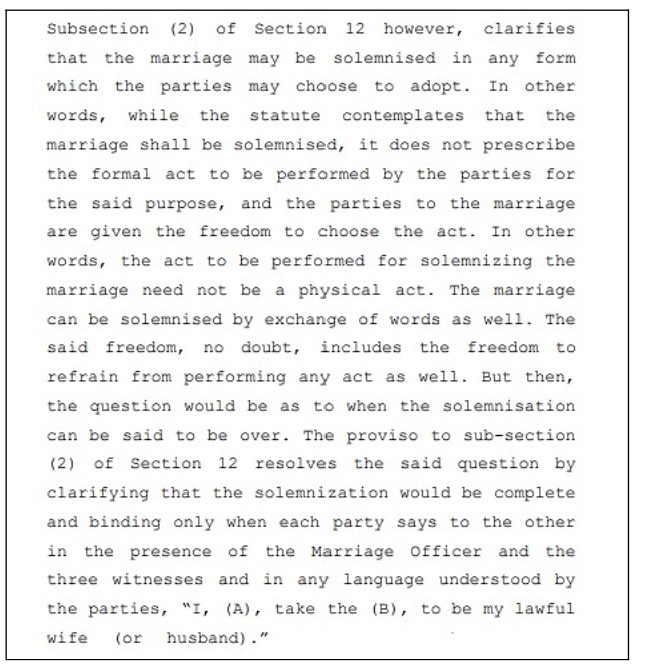
On whether the marriage can be solemnized through video conference, the single judge bench relied on the State of Maharashtra vs. Praful B. Desai (Dr), whereby the question considered was whether evidence can be recorded through video conferencing in a criminal trial. It was in this case, the doctrine of ‘updating construction’ was relied upon.
Further, the court held that Special Marriage Act must be read in light of the Information Technology Act, of 2000. Section 6 of the Information Technology Act,2000 recognise the use of electronic records in the Government and its agencies.
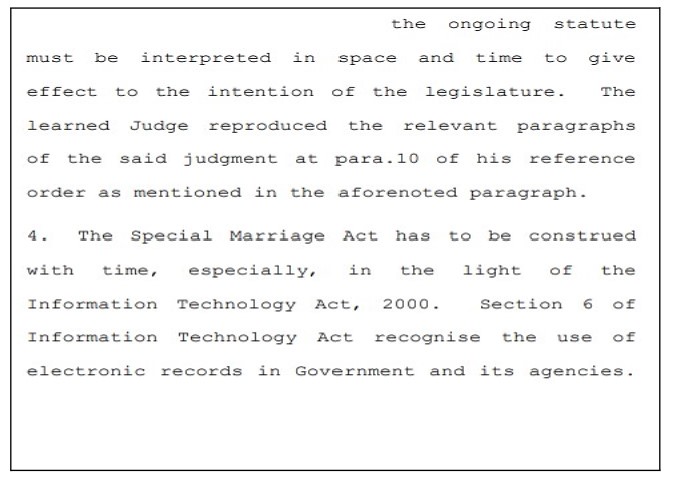
Accordingly, the court held that it cannot refuse the online solemnization of marriage under the special marriage act and directed the government for compliance until the prescription of any other modes.


